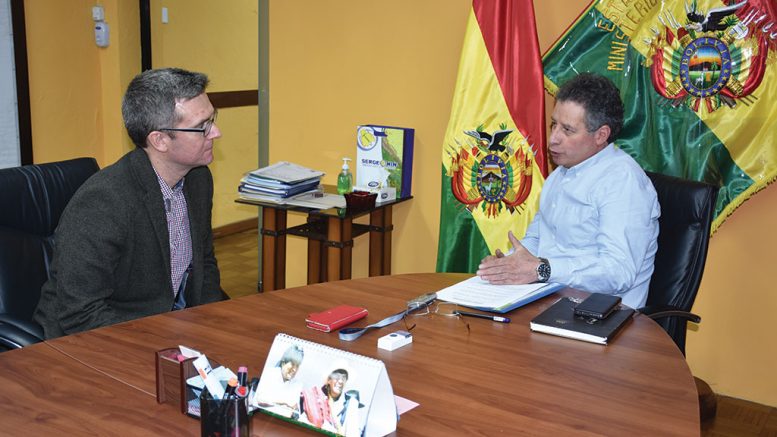LA PAZ, BOLIVIA — The Bolivian government is “building a new relation between business and the state,” Bolivia’s Mining and Metallurgy Minister Cesar Navarro tells The Northern Miner in a sit-down interview in his government office.
Soon after taking office in January 2006, Bolivian President Evo Morales laid down the law to foreign companies. The new relationship between the state and investors would be that of partners, not “master and servant.”
True to his word, the president acted where he believed the partnership had broken down. Troops were sent to occupy the Vinto tin smelter, where the government said that commodity giant Glencore (LON: GLEN) had failed to carry out promised investments.
Mines, power plants and gas-fields followed, building up Morales’ popularity with supporters, but scaring off all but the bravest investors.
A decade on, Morales’s mines minister Navarro is looking to attract foreign companies back to its mining industry.
Economic necessities partly explain the about-turn.
Despite Bolivia’s massive geological potential, its mining industry remains tiny. In 2017, it exported just US$2.2-billion worth of minerals, compared with US$37 billion from neighbouring Chile.

A protester opposed to South American Silver’s Malku Khota silver project stands in front of a barrier blocking access to the Bolivian presidential palace in the capital La Paz in 2012. Photo by Alexis Aubin. al.aphoto@hotmail.com. alexisaubin.blog.com

Bolivia’s president Evo Morales is hoisted up after announcing a government investment in the Huanuni Mining Company in 2014. Credit: Bolivia Ministry of Communication.
Meanwhile, revenues from Bolivia’s gas exports, the windfall which has bankrolled Morales’ public spending drive, are declining.
In addition, the government is facing the costs of its earlier clashes with the global mining industry. Last November, the Permanent Court of Arbitration ordered Bolivia to pay South American Silver US$27 million for the government’s expropriation in 2012 of the junior’s Malku Khota silver deposit. (The company has since renamed itself TriMetals Mining [TSX: TMI] and reoriented towards U.S. gold exploration.)
Now the Bolivian government is facing a US$700-million claim from Glencore over Vinto and other assets.
To attract fresh investment to the sector, Navarro has travelled widely aiming to convince companies of the Bolivian government’s new openness to foreign investment.
Since taking office five years ago, he has attended three PDACs in a row, as well as events in Vancouver, New York and London.
The message, he says, is getting through.
Despite the nationalizations, a handful of private companies have continued to invest and operate in Bolivia, highlighted by Sumitomo’s San Cristobal silver-zinc-lead mine and Pan American Silver’s (TSX: PAAS; NASDAQ: PAAS) San Vicente silver-zinc-lead mine.
“Japanese, Canadian and Swiss capitals have all been able to live with us,” the minister notes.

Drillers at New Pacific Metals’ Silver Sand silver property in Bolivia. Credit: New Pacific Metals.
But many of these operations are approaching the end of their mine life, and investment is needed to explore and develop new mines.
The vehicle for the new relationship is the Mining Production Contract, which private investors can sign with state mining company Comibol, which owns or has first say over the most prospective ground.
Although the state has ownership of the resource, it grants the company a lengthy concession period during which it can explore, build and operate a mine.
In exchange, the company promises to undertake certain investments in stages throughout the project’s life, including rehabilitating the site when the mine closes.
Once signed with Comibol, the contract is sent to Congress, where it would be approved as a law and finally promulgated by the president himself, giving the contract considerable legal weight.
In January, Navarro signed the first such deal for an exploration project with Vancouver-based New Pacific Metals (TSXV: NUAG; US-OTC: NUPMF). The 45-year contract is due to receive legislative approval by mid-year.
The government is already in talks with potential partners, and aims to sign at least two more contracts by year-end.
At Comibol’s offices in La Paz, CEO Zelmar Andia’s desk is stacked with information on gold, zinc and tin projects ready for investors to peruse.
“We have all the minerals — our deposits are large and world-class — but Bolivia needs companies to come and invest, and believe in us again,” the executive says.

The Vinto tin smelter in Bolivia’s Oruro Department after its nationalization in 2007. Vinto Metallurgical Co. started as a state enterprise in 1966, and was privatized in 1999. Credit: Empresa Metalúrgica Vinto.
That could be a hurdle, given the expropriations of the recent past.
But Minister Navarro dismisses such fears. Past expropriations, such as Glencore’s Colquiri mine or Malku Khota, were usually in response to often violent breakdowns in community relations.
“Any state would do the same, if a project is harming the population or causing conflict,” he says.
This time around, to ensure the sustainability of new investments, the government is concentrating on building the necessary trust, not just between the state and business, but also with local communities.
“In Bolivia, like everywhere else in Latin America, if you have a bad relationship with the community, they won’t open the door to let you in,” Navarro says.
The government is doing its part to improve relations in mining areas, seeking to settle long-running rivalries between indigenous communities, mining cooperatives and others, which were often exacerbated by the arrival of a foreign company.
Fortunately, the latest cohort of mining companies looking to invest in Bolivia seems to have a much more enlightened attitude to government and community relations.
“New Pacific has developed a very interesting relationship with the communities,” the minister notes.
— Based in Santiago, Chile, Tom Azzopardi is a freelance journalist specializing in the resource industries.
RELATED STORIES:
Bolivia’s door creaks open to foreign mining investment
Arbitration court awards South American Silver US$28M for Bolivian concession
TriMetals Mining rises from the ashes of Bolivia
Bolivian gov’t seizing Malku Khota
RELATED VIDEO:


Be the first to comment on "Bolivian gov’t seeks a new deal with miners, says Minister Navarro"